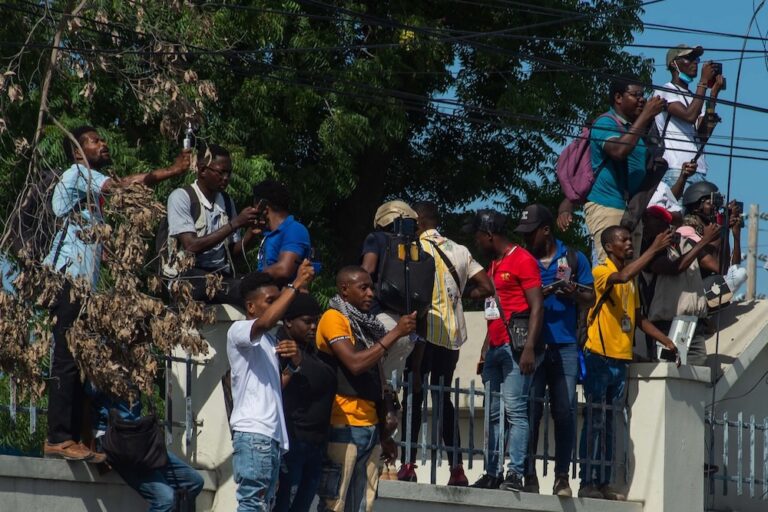In 2023, the Haitian press was a victim of crimes, kidnappings, and multiple threats.
This statement was originally published on en.sipiapa.org on 3 January 2024.
By Javier Valdivia*
Journalist murders decreased in Haiti in 2023 compared to the previous year, but the local press continued to be a victim of crimes, kidnappings, and multiple threats due to high levels of instability and violence prevailing in the country.
The absence of guarantees, the lack of minimum safety conditions, and the high degree of impunity throughout Haiti marked a dark year for the press, which remained committed to its work despite the serious dangers it faces.
Journalists Paul Jean Marie from Radio Lumière (May 5), Ricot Jean from Radio-Télé Évolution Inter (April 25), and Dumesky Kersaint from Radio Télé Inurep (April 18) were murdered in the northern town of Saint-Marc and on the outskirts of Port-au-Prince, the capital of Haiti. No one was arrested for these crimes.
In 2022, one of the deadliest years for the Haitian press in several decades, nine journalists were killed: Francklin Tamar from Radio Solidarité; Fritz Dorilas from Radio Megastar; Romelo Vilsaint and Wilguens Louissaint, both contributors to digital media; Garry Tess from Radio Lebon FM; Frantzsen Charles from FS NEWS; Tayson Lartigue from Tijèn Jounalis; Maxihen Lazarre from Roi des infos, and Amady John Wesley from radio Écoute FM.
Kidnappings also affected Haitian press workers in 2023, with a total of five cases. The latest was Banatte Daniel, kidnapped on December 15 and released 11 days later after a ransom payment that could have reached $500,000, as reported.
Haitian media reported on the kidnapping of Radio Scoop FM presenter Pierre-Fils Saintamour, which occurred in a populous commune northeast of Port-au-Prince. Saintamour was kidnapped on November 27 in the company of his two children and pregnant wife, and released on December 8 after a high sum of money was paid, according to the victim’s statements.
Three other kidnappings occurred in 2023. Marie Lucie Bonhomme Opont, a journalist from Radio Vision 2000, was kidnapped for a few hours on June 14; Pierre Louis Opont, Bonhomme’s husband and co-owner of Télé Pluriel, was kidnapped on June 20 and released on August 25, and Blondine Tanis, co-host on Radio Rénovation FM 107.1, was kidnapped on July 21 and released nine days later. Journalist Juno Jean-Baptiste reported that he was a victim of a kidnapping attempt on December 22 but managed to escape.
The constant violence exerted by gangs directly affected a dozen Haitian journalists. In early September, some of their residences were burned, and others were forced to leave their homes in Carrefour-Feuilles, a populous sector southwest of Port-au-Prince where the gang known as Grand Ravine controls the area. According to the International Organization for Migration, more than 16,000 people had to take refuge due to fear of violence.
Among the affected journalists were Réginald Esaie Orélus and Richardson Jourdan from Télévision Nationale d’Haïti (TNH); Jacques Desrosiers, secretary-general of the Haitian Journalists Association; Celou Flécher and Dessources Dieumaitre, directors-general of Le Facteur and Fact Checking News, both digital media; and Samuel Dallemand and Rubens Artist, reporters for Télé Ginen.
Additionally, Jean Yves Saint-Louis, journalist from Radio Lumière; Kettia Marcellus from the Solidarity of Haitian Women Journalists organization (SOFEHJ in French); Jacques Stevenson Saint-Louis, journalist from Radio Educativa, Ministry of Education; Arnold Junior, reporter from Radio Galaxie, and Judex Vélima, reporter from Télé Espace.
At the end of August, the same Grand Ravine gang members had already set fire to the house of journalist Arnold Junior Pierre, who was left homeless with his family.
Assaults on journalists were also common. On July 20, reporters Daniel Lamartinière from Vant Bèf info and Jameson Jean Baptiste from JB Média were beaten by a police officer while covering a demonstration against the government in the capital. On July 23 in Liancourt (north), the headquarters of radio Antarctique 96.1 FM was set on fire during a gang attack.
On July 31, reporter Arnold Junior Pierre was beaten while covering a protest southwest of Port-au-Prince; on August 11, Brown Larose, host of the “Matin Débat” show on Radio Télé Éclair, was shot in front of his home but survived the attack, and in December, reporter Johnny Ferdinand eluded an attack by armed men on motorcycles.
In terms of legal problems, the AyiboPost portal and its editor-in-chief, Widlore Mérancourt, were sued on September 14 by Delphine Gardère, owner of Ron Barbancourt, one of Haiti’s major companies, alleging that a report on June 7 about the company made defamatory accusations about Gardère’s election as president of the Franco-Haitian Chamber of Commerce and Industry.
On December 10, Wilkens Thirogène (alias Pouchon), detained for several months for his alleged involvement in the murder of journalist and political commentator Garry Tesse in October 2022, was released.
In a letter to the Minister of Justice, Emmelie Prophète, the organization SOS Journalistes criticized the prosecutor at the Les Cayes first-instance court (southwest) for releasing the alleged accomplice and called for actions to prevent impunity in this and other unresolved cases of journalist crimes.
In 2023, Haitian journalism also lost two iconic figures.
On July 31, at the age of 70, Lilianne Pierre-Paul, a reference for freedom of expression, the fight for democracy, and human rights, passed away at her home in Port-au-Prince due to a massive heart attack as she was getting ready to go to the facilities of Radio Kiskeya, the popular station she co-founded on May 7, 1994.
Pierre-Paul helped establish the popularity of Radio Haiti Inter and later rose to become the owner of Kiskeya and later vice president of the National Association of Media of Haiti (which she helped found in 2001), the last position she held. Born on June 16, 1953, in the southeastern city of Petit-Goâve, the renowned journalist suffered imprisonment and exile for confronting the dictatorship of Jean-Claude Duvalier in the seventies and eighties but also witnessed her country’s transition to democracy in 1987.
On October 26, in the city of Brockton, Massachusetts, Jean-Claude Sanon, a recognized sports columnist and radio announcer, died. In addition to being a footballer, Sanon served as the secretary-general of the Haitian Football Federation (FHF). Sanon (82), was a prominent columnist in publications such as Nouveau Monde and Le Nouvelliste, and since 1965, he hosted a sports show on Radio MBC, where he would become its most representative voice, both in the narration of football matches and other sports disciplines.
One of the few pieces of good news occurred on March 2 when the dean of the written press, Le Nouvelliste, resumed circulation after a five-month disruption due to the crisis affecting the country, although its distribution still did not reach sectors of the Haitian capital. In its editorial that day, the leadership of the main local morning newspaper highlighted its return but warned that its physical reappearance occurred at a time when the center of Port-au-Prince, the “historical home” of Le Nouvelliste, continued to be plagued by violent clashes.
The newspaper announced on October 27, 2022, its “painful obligation to suspend its circulation until further notice,” unable to supply fuel, distribute the newspaper, and after exhausting its last paper stocks. The reasons were the blockade imposed by a gang on the main fuel terminal in the capital and the extreme violence exerted by gangs dominating various areas of Port-au-Prince.
The Inter American Press Association (IAPA) frequently condemned the fragile situation of the Haitian press, the murders, and the attacks on media representatives. It also called on the government to take necessary actions so that crimes against journalists do not go unpunished and urged authorities to develop mechanisms to assist those who have been forced to leave their homes due to high levels of violence.
On October 3, the United Nations approved the dispatch of a multinational force to the country to assist the police in ensuring the safety of the population. The mission, which is expected to be led by Kenya, is awaiting a decision from the Kenyan Supreme Court to allow its deployment.
That same month, the UN Security Council renewed a resolution approved in 2022, imposing a regime of sanctions and ‘demanding the immediate cessation of violence, criminal activities, and human rights abuses undermining the peace, stability, and security of the country and the region.
*The author is the Regional Vice President for Haiti of the IAPA Committee on Freedom of the Press and Information.



